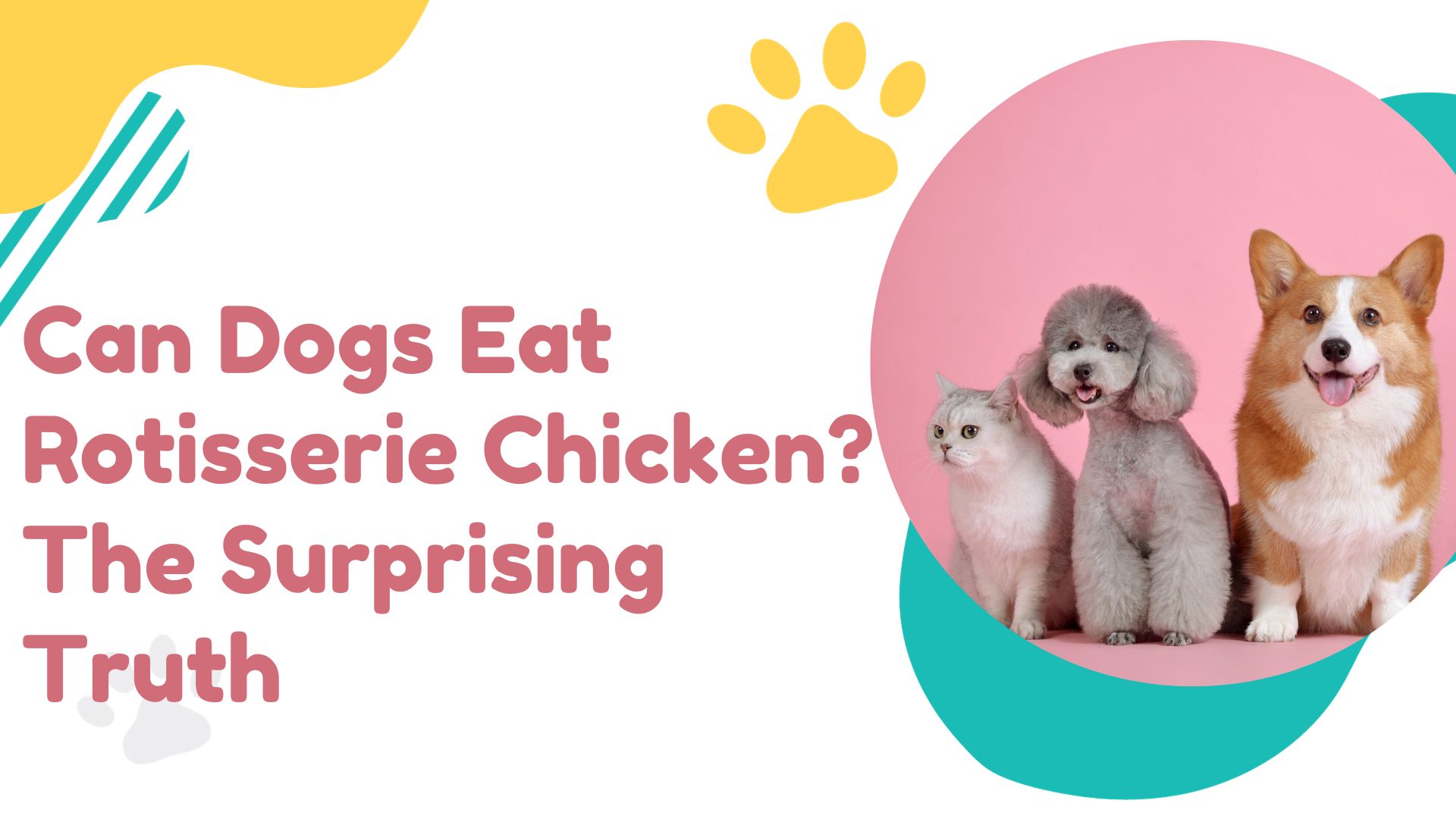Can Dogs Eat Rotisserie Chicken? The Surprising Truth
Can Dogs Eat Rotisserie Chicken? A Vet's Advice for Safely Feeding Fido This Favorite Human Food

Rotisserie chicken is a staple grab-and-go meal for many humans. The savory roasted chicken is already cooked hot and ready to eat from the deli section of grocery stores.
Can Dogs Eat Rotisserie Chicken? Let’s take a closer look at the potential benefits and risks.
In short – yes, dogs can eat rotisserie chicken in moderation. Rotisserie chicken can be fed to dogs on occasion as a tasty treat. It provides lean protein, vitamins, and minerals that dogs need.
However, there are some health concerns to be aware of, like bones, salt, and excess fat. Read on to learn more tips for safely feeding your dog rotisserie chicken.
Health Benefits of Rotisserie Chicken for Dogs
Rotisserie chicken contains beneficial nutrients for dogs, such as:
- Protein for muscle, organ, and immune system health
- Vitamin B6 for metabolism and red blood cell production
- Phosphorus for bone, teeth, and cell repair
- Selenium for thyroid function and antioxidants
When prepared properly, small amounts of rotisserie chicken can be a tasty part of your dog’s balanced diet. It makes a nice change of pace from plain dog food.
Potential Dangers of Feeding Dogs Rotisserie Chicken
However, there are some risks associated with feeding rotisserie chicken to dogs:
- Bones can splinter and damage dogs’ mouths or intestines
- High salt content can cause excessive thirst and urination
- Seasonings like garlic or onion powder are toxic to dogs
- Too much fat can lead to obesity or pancreatitis
To help avoid these dangers, proper preparation is key. Never feed dogs rotisserie chicken bones. Remove the skin and trim excess fat before serving.
Only feed your dog shredded, cooked meat without seasonings.
Interview With a Veterinary Nutritionist
Dr. Sarah Johnson, DVM and veterinary nutrition specialist, provides her professional perspective:
“Rotisserie chicken can be an occasional part of a balanced homemade diet for dogs. Owners must be very careful to avoid bones, skin, and fat that can pose risks.
Stick to feeding only the lean, cooked chicken meat in small portions. Too much salt and fat from rotisserie chicken could lead to serious health issues over time. It’s best to consult your vet if you have any concerns.”
Dr. Johnson recommends lean chicken make up no more than 10% of a dog’s total daily calories. Supplement with dog-friendly fruits, vegetables, grains, and commercial dog food.
Monitor your dog for any signs of an upset stomach when introducing new foods.
How Much Rotisserie Chicken Can Dogs Eat?
It’s best to feed rotisserie chicken to dogs in strict moderation. As Dr. Johnson suggested, no more than 10% of your dog’s daily caloric needs should come from chicken or any single protein source.
For a 50-pound dog, that equals around 2-3 ounces of cooked chicken.
For small dogs, feed just 1-2 bites of shredded chicken as an occasional treat. Large dogs may be able to handle 1/4 to 1/2 cup at a time. But do not make rotisserie chicken a significant part of any dog’s diet.
Tips for Feeding Dogs Rotisserie Chicken Safely
When preparing rotisserie chicken for your dog, follow these tips:
- Remove all bones, skin, and visible fat
- Shred or dice chicken into bite-sized pieces
- Mix a small amount with their regular dog food
- Refrigerate promptly and reheat fully before feeding
- Avoid seasonings/marinades flavored for humans
Talk to your veterinarian if you have further questions about incorporating rotisserie chicken into your dog’s homemade meals.
With proper precautions, this savory chicken can be a nutritious and tasty occasional treat.
4 Can Dogs Eat Rotisserie Chicken? Tips for Feeding Dogs Rotisserie Chicken Safely

Now that you know the potential benefits and risks of feeding rotisserie chicken to dogs, let’s look at some best practices for doing so safely.
With proper preparation and storage, you can incorporate small amounts of this lean protein into your dog’s diet.
1. Remove Bones, Skin, and Fat
Can Dogs Eat Rotisserie Chicken? The first step is removing any non-edible parts before you feed rotisserie chicken to your dog. Discard the bones, which can splinter and cause choking hazards or intestinal damage.
The skin and visible fat are very high in sodium and unhealthy fats, so these should also be taken off.
2. Only Use Shredded, Cooked Meat
Next, shred or finely dice the cooked chicken into bite-sized pieces appropriate for your dog. This makes it easier to chew and digest.
Do not feed dogs any uncooked chicken, as undercooked poultry increases the risk of transmitting salmonella. Cooked rotisserie chicken from the grocery store deli is a safer option.
Nutritional Comparison
This table compares some key nutrient levels between rotisserie chicken, raw chicken, and dry dog food:
| Protein | Fat | Sodium | |
| Rotisserie Chicken | 31g | 15g | 730mg |
| Raw Chicken Breast | 31g | 3.6g | 74mg |
| Dry Dog Food | 25g | 13g | 200mg |
As shown, rotisserie chicken can be significantly higher in fat and sodium than alternatives due to skin, seasonings, and cooking methods. This is why portion control is so important.
3. Mix With Regular Dog Food
For a balanced meal, mix a few small pieces of shredded rotisserie chicken into your dog’s regular dog food. The chicken can add flavor and texture, while the dog food maintains the right nutritional balance.
4. Proper Storage Is Crucial
As with any fresh cooked meat, promptly refrigerate or freeze any rotisserie chicken. Leftovers should not sit out at room temperature for more than 2 hours.
When reheating rotisserie chicken for your dog, ensure it reaches an internal temperature of at least 165°F first to kill any bacteria.
Can Dogs Eat Rotisserie Chicken? Do not keep leftovers longer than 3-4 days, even in the refrigerator. Spoiled chicken can cause serious food poisoning in dogs.
Monitor your dog closely for any vomiting, diarrhea, or other signs of upset stomach after eating chicken.
Read More: Can Dogs Eat Lychees?
Alternatives to Consider
While the occasional shredded chicken can be fed as a treat, consider lean turkey, whitefish, or plain chicken breast as healthier alternatives.
There are also many commercial dog food options fortified with vitamins and minerals not found in plain chicken. Talk to your vet about the ideal main sources of protein for your dog.
As with any human food, introduce rotisserie chicken gradually and in moderation. Follow the tips here to give your dog a tasty chicken meal that is safe and healthy.



